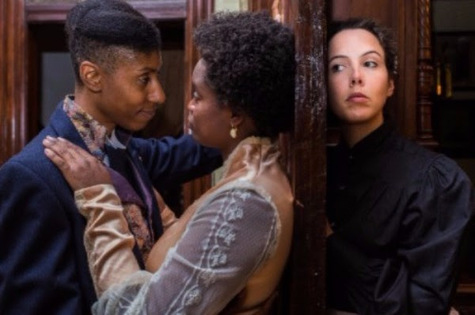|
By Leigh Austin
Living in a city that has an entire neighborhood covered in rainbow banners and dedicated to celebrating the gay community, it’s easy to forget that, less than 2 decades ago, the then-President of the United States was arguing against gay people having “special rights” (you know, like having their relationships legally recognized); that the first major political party to endorse a homosexual rights platform spoke out in 1980; that the American Psychiatric Association listed homosexuality as a “mental illness” until 1973 . That long history of oppression and prejudice toward the gay community is exactly what Pride Films and Plays’ (PFP) world premiere seeks to remind us.
Resolution takes us back to 1892, where high-society husband and wife Jack (T. Mitchenor) and Hannah (A. Hicks) live a rich but charitable life--they spoil their house staff with generous holiday bonuses and vacations, attend elaborate charitable events, and collect coats and food for underprivileged families. Yet, despite their benevolence, when the couple’s biggest secret is undercovered by their housekeeper Maggie (A. Snyder), Jack and Hannah’s lives swiftly (in the span of 70 minutes, no intermission, to be exact) become characterized by a lack of acceptance; a foregoing of any of that affection and care which the couple have themselves exemplified for years. I’ll stop there at risk of giving too much away (which PFP expertly does by concealing aspects of the program until the final curtain), but, in short, the fast-paced, “vintage queer thriller for the modern era,” (as PFP describes it), revolves around a conflict that surely resonates with modern audiences: individuals with conflicting moral stances forced to try and reconcile their differences. While the subject matter itself is unique and something woefully underexplored (this is, at least, my first experience with a ‘vintage queer thriller’), the script’s serious subject matter is undercut by the genre in which it presents itself. These characters are dealing with potentially life-threatening issues, yet the scenes play out more like a scene from Agatha Christie’s Mousetrap. Hicks and Michenor do their best to create chemistry between the play’s protagonists, but the short script never gives the audience time to appreciate or truly buy into their shared affection; instead, their relationship is told through a series of over-the-top, “comedic” scenes that elicited few sniggers and little feeling (which is possibly a critique less of the actors themselves and more of the choices made by director Diana Raiselis). Snyder notably manages to squeeze a few much-needed silent moments into the dialogue-heavy scenes, but E. Fraim’s (who plays Maggie’s husband Harrison) wide eyed stares into the audience and final ‘break in the fourth wall’ narration do little to counteract the feeling that this is less a thought-provoking, period piece exploring homosexual intolerance and more a Christie-esque romp. In short, what could have been, and in a few instances was (most notably in Hicks’ final appeal), a wonderfully emotional piece, suffered from a case of the right plot stuck in the wrong genre. Somewhat Recommended. Resolution is presented by Pride Films and Plays at Rivendell Theatre. More info: http://pridefilmsandplays.com/ All dates taken from “Milestones in the American Gay Rights Movement:” http://www.pbs.org/wgbh/americanexperience/features/timeline/stonewall/
0 Comments
Leave a Reply. |
the hawkThe Hawk was a common name for the cold, winter wind in Chicago, possibly even predating "the Windy City." Additionally, a hawk can see up to eight times more clearly than the human eye. CategoriesAll Announcements Blog Reviews Archives
March 2017
|

 RSS Feed
RSS Feed